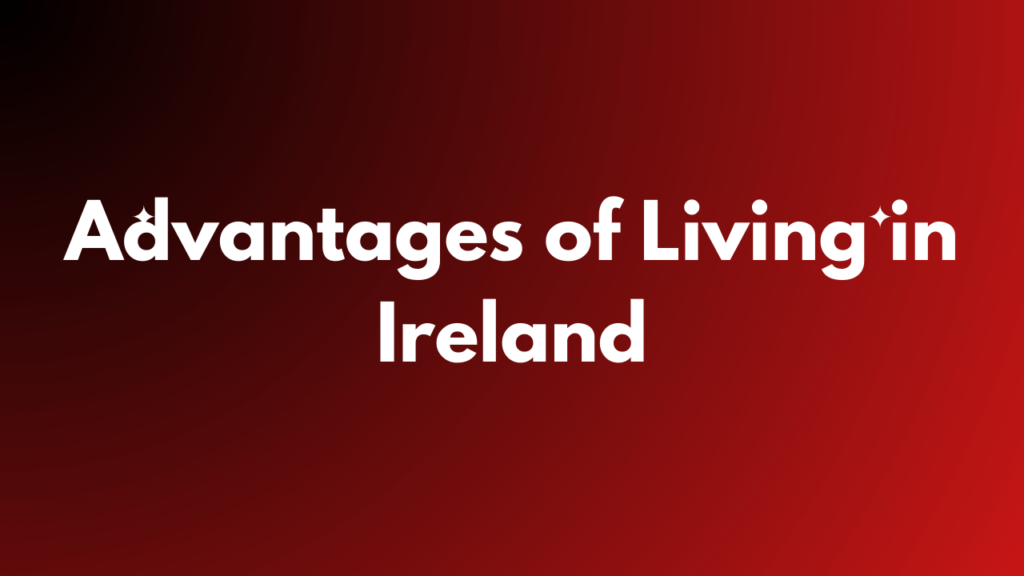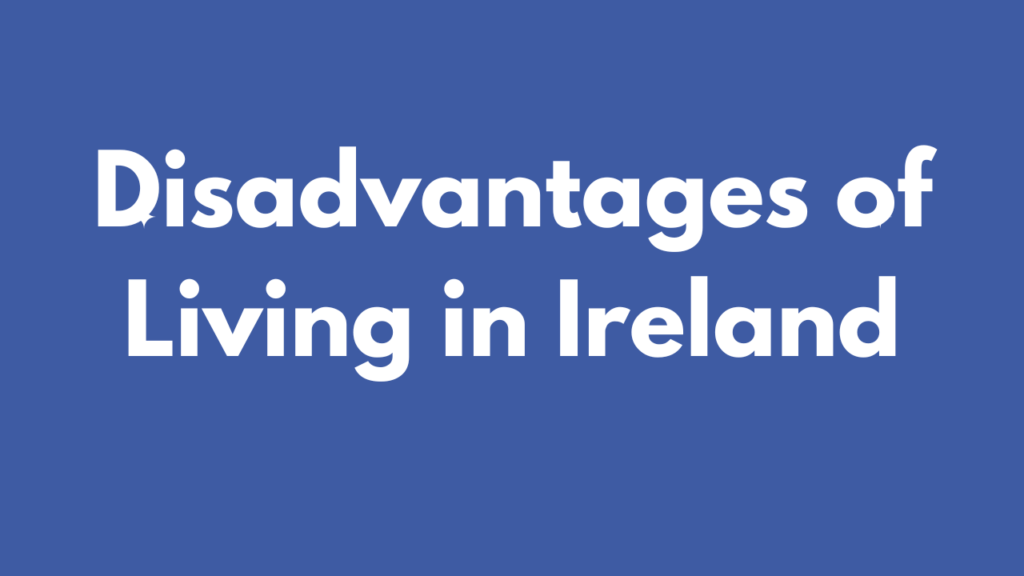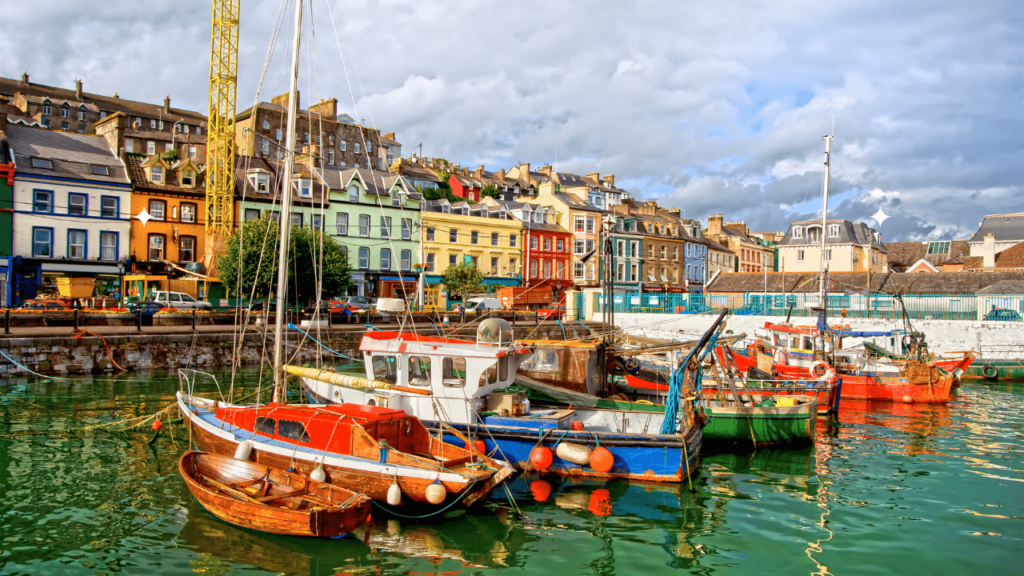Ireland, often referred to as the “Emerald Isle,” is a country known for its lush landscapes, rich history, and vibrant culture. Whether you’re considering moving to Ireland for work, study, or simply a change of scenery, it’s important to weigh the pros and cons of living in this beautiful country. In this blog post, we’ll explore the advantages and disadvantages of living in Ireland, providing you with a comprehensive overview to help you make an informed decision.
2. Advantages of Living in Ireland

2.1 Natural Beauty and Scenic Landscapes
Ireland is renowned for its breathtaking natural beauty. From the rugged cliffs of Moher to the serene lakes of Killarney, the country offers a diverse range of landscapes that are perfect for nature lovers.
- Cliffs of Moher: One of Ireland’s most famous natural attractions, offering stunning views of the Atlantic Ocean.
- Killarney National Park: A haven for hikers and nature enthusiasts, with lush forests, lakes, and mountains.
- Ring of Kerry: A scenic drive that takes you through some of Ireland’s most picturesque landscapes.
- Giants Causeway: Located in Northern Ireland, this UNESCO World Heritage site is a geological wonder.
2.2 Friendly and Welcoming People
The Irish are known for their warmth and hospitality. Whether you’re a local or a foreigner, you’ll find that people in Ireland are generally friendly and welcoming.
- Community Spirit: Irish towns and villages often have a strong sense of community, making it easy to feel at home.
- Pub Culture: Pubs are a central part of Irish social life, offering a great way to meet new people and experience local culture.
2.3 Rich Cultural Heritage
Ireland has a rich cultural heritage that is deeply rooted in its history, music, and literature.
- Traditional Music: Ireland is famous for its traditional music, with sessions often taking place in local pubs.
- Literature: Ireland has produced some of the world’s most renowned writers, including James Joyce, W.B. Yeats, and Samuel Beckett.
- Festivals: Ireland hosts numerous festivals throughout the year, celebrating everything from music and film to food and literature.
2.4 High Quality of Life
Ireland consistently ranks high in global quality of life indexes, thanks to its excellent healthcare, education, and work-life balance.
- Work-Life Balance: Irish employers generally prioritize work-life balance, with generous vacation time and flexible working hours.
- Safety: Ireland is considered one of the safest countries in Europe, with low crime rates.
2.5 Strong Economy and Job Opportunities
Ireland has a strong economy, driven by sectors such as technology, pharmaceuticals, and finance.
- Multinational Companies: Many multinational companies, including Google, Facebook, and Apple, have their European headquarters in Ireland.
- Job Market: The job market is robust, particularly in sectors like IT, engineering, and healthcare.
2.6 Excellent Education System
Ireland is home to some of the world’s top universities and offers a high standard of education.
- Trinity College Dublin: One of the oldest and most prestigious universities in Europe.
- University College Dublin: Known for its strong research programs and international student body.
- Primary and Secondary Education: Ireland’s primary and secondary education system is highly regarded, with a focus on holistic development.
2.7 Access to Healthcare
Ireland has a well-developed healthcare system, with both public and private options available.
- Public Healthcare: Irish citizens and residents are entitled to free or subsidized healthcare through the public system.
- Private Healthcare: For those who prefer private healthcare, there are numerous private hospitals and clinics offering high-quality care.
2.8 Safe and Peaceful Environment
Ireland is known for its peaceful environment, making it an ideal place to raise a family.
- Low Crime Rates: Ireland has one of the lowest crime rates in Europe, contributing to a sense of safety and security.
- Political Stability: Ireland is a politically stable country, with a strong democratic tradition.
2.9 English-Speaking Country
As an English-speaking country, Ireland is an attractive destination for expats from English-speaking countries.
- Ease of Communication: English is the primary language spoken in Ireland, making it easy for expats to communicate and integrate.
- Global Business Hub: Ireland’s English-speaking status makes it a hub for international business and trade.
2.10 Proximity to Europe
Ireland’s location makes it an ideal base for exploring Europe.
- Short Flights: Ireland is just a short flight away from major European cities like London, Paris, and Berlin.
- Travel Opportunities: With its proximity to Europe, Ireland offers endless travel opportunities for those who love to explore.
3. Disadvantages of Living in Ireland

3.1 High Cost of Living
One of the biggest drawbacks of living in Ireland is the high cost of living, particularly in cities like Dublin.
- Housing Costs: Rent and property prices in Dublin are among the highest in Europe.
- Everyday Expenses: Groceries, dining out, and other everyday expenses can be costly.
- Childcare: Childcare costs in Ireland are some of the highest in Europe, making it challenging for working parents.
3.2 Unpredictable Weather
Ireland is known for its unpredictable weather, which can be a challenge for those who prefer a more stable climate.
- Rainfall: Ireland experiences frequent rainfall throughout the year, which can be a downside for those who enjoy outdoor activities.
- Temperature: Summers are generally mild, while winters can be cold and damp.
3.3 Housing Crisis
Ireland is currently facing a housing crisis, with a shortage of affordable housing in many areas.
- Rental Market: The rental market is highly competitive, with high demand and limited supply.
- Homelessness: The housing crisis has led to an increase in homelessness, particularly in urban areas.
3.4 Public Transportation Issues
While Ireland has a public transportation system, it is often criticized for being unreliable and inefficient.
- Rural Areas: Public transportation in rural areas is limited, making it difficult for those without a car to get around.
- Urban Areas: Even in cities like Dublin, public transportation can be overcrowded and prone to delays.
3.5 Limited Career Opportunities in Certain Fields
While Ireland has a strong job market in sectors like IT and healthcare, opportunities in other fields can be limited.
- Creative Industries: Jobs in the creative industries, such as arts and media, can be hard to come by.
- Niche Fields: Those working in niche fields may find it challenging to find relevant job opportunities.
3.6 High Taxes
Ireland has a relatively high tax burden, which can be a disadvantage for those looking to maximize their income.
- Income Tax: Ireland’s income tax rates are among the highest in Europe.
- Value-Added Tax (VAT): The standard VAT rate in Ireland is 23%, which is higher than in many other European countries.
3.7 Rural Isolation
While Ireland’s rural areas are beautiful, they can also be isolating, particularly for those used to city life.
- Limited Amenities: Rural areas often have limited access to amenities like shops, restaurants, and healthcare facilities.
- Social Life: Social life in rural areas can be quieter, with fewer opportunities to meet new people.
3.8 Alcohol Culture
Ireland has a strong drinking culture, which can be a downside for those who prefer a more sober lifestyle.
- Pub Culture: Pubs are a central part of Irish social life, which can make it difficult for non-drinkers to socialize.
- Alcohol Consumption: Ireland has one of the highest rates of alcohol consumption in Europe, which can contribute to social issues.
3.9 Healthcare System Challenges
While Ireland has a well-developed healthcare system, it is not without its challenges.
- Waiting Times: Waiting times for non-emergency treatments can be long, particularly in the public system.
- Access to Specialists: Access to specialists can be limited, particularly in rural areas.
3.10 Distance from Family and Friends
For expats, one of the biggest challenges of living in Ireland can be the distance from family and friends.
- Travel Costs: Traveling to and from Ireland can be expensive, particularly for those with family in distant countries.
- Time Difference: The time difference can make it difficult to stay in touch with loved ones in different time zones.
Summary Table: Advantages and Disadvantages of Living in Ireland
| Advantages | Disadvantages |
|---|---|
| Natural Beauty and Scenic Landscapes | High Cost of Living |
| Friendly and Welcoming People | Unpredictable Weather |
| Rich Cultural Heritage | Housing Crisis |
| High Quality of Life | Public Transportation Issues |
| Strong Economy and Job Opportunities | Limited Career Opportunities in Certain Fields |
| Excellent Education System | High Taxes |
| Access to Healthcare | Rural Isolation |
| Safe and Peaceful Environment | Alcohol Culture |
| English-Speaking Country | Healthcare System Challenges |
| Proximity to Europe | Distance from Family and Friends |
Frequently Asked Questions (FAQs) About Living in Ireland
Here are some common questions people have about living in Ireland, along with detailed answers to help you better understand what life in the Emerald Isle is like.
1. Is Ireland a good place to live?
Yes, Ireland is generally considered a great place to live due to its high quality of life, friendly people, stunning landscapes, and strong economy. However, like any country, it has its challenges, such as the high cost of living and unpredictable weather.
2. What is the cost of living in Ireland?
The cost of living in Ireland is relatively high, especially in cities like Dublin. Key expenses include:
- Housing: Rent and property prices are among the highest in Europe.
- Groceries: Weekly grocery shopping can be expensive compared to other countries.
- Transportation: Public transport is affordable, but owning a car can be costly due to insurance and fuel prices.
- Childcare: Childcare costs are some of the highest in Europe.
3. How is the healthcare system in Ireland?
Ireland has a mixed public and private healthcare system:
- Public Healthcare: Irish citizens and residents are entitled to free or subsidized healthcare, but waiting times for non-emergency treatments can be long.
- Private Healthcare: Many people opt for private health insurance to access faster care and more specialized services.
4. What is the weather like in Ireland?
Ireland has a temperate maritime climate, which means:
- Rainfall: Frequent rain throughout the year.
- Temperature: Mild summers (15-20°C) and cool winters (4-8°C).
- Unpredictability: Weather can change quickly, so it’s common to experience “four seasons in one day.”
5. Is Ireland safe to live in?
Yes, Ireland is one of the safest countries in Europe, with low crime rates and a peaceful environment. However, like anywhere, it’s important to take basic safety precautions.
6. How easy is it to find a job in Ireland?
Ireland has a strong job market, particularly in sectors like technology, pharmaceuticals, and finance. However:
- Competition: Jobs in cities like Dublin can be competitive.
- Niche Fields: Opportunities in creative or niche industries may be limited.
7. What is the education system like in Ireland?
Ireland has an excellent education system, with:
- Primary and Secondary Schools: Free public education is available, and the curriculum is well-regarded.
- Universities: Ireland is home to world-class universities like Trinity College Dublin and University College Dublin.
- International Students: Ireland is a popular destination for international students due to its high-quality education and English-speaking environment.
8. How is the public transportation system in Ireland?
Public transportation in Ireland is decent but has some limitations:
- Cities: Dublin has buses, trams (Luas), and trains (DART), but services can be crowded and prone to delays.
- Rural Areas: Public transport is limited, so having a car is often necessary.
9. What is the housing situation like in Ireland?
Ireland is currently facing a housing crisis, with:
- High Demand: A shortage of affordable housing, particularly in cities.
- Rising Prices: Rent and property prices have increased significantly in recent years.
- Homelessness: The housing crisis has contributed to rising homelessness rates.
10. Is Ireland an English-speaking country?
Yes, English is the primary language spoken in Ireland, making it easy for expats to communicate and integrate. Irish (Gaelic) is also an official language but is spoken less frequently in everyday life.
11. How is the work-life balance in Ireland?
Ireland is known for its good work-life balance:
- Vacation Time: Employees are entitled to at least 20 days of paid annual leave.
- Flexible Work: Many companies offer flexible working hours and remote work options.
12. What are the taxes like in Ireland?
Ireland has relatively high taxes, including:
- Income Tax: Progressive rates up to 40% for higher earners.
- VAT: A standard rate of 23% on goods and services.
- USC (Universal Social Charge): An additional tax on income.
13. Is Ireland a good place to raise a family?
Yes, Ireland is a great place to raise a family due to:
- Safety: Low crime rates and a peaceful environment.
- Education: High-quality schools and universities.
- Community: Strong sense of community in towns and villages.
However, high childcare costs and the housing crisis can be challenges for families.
14. How is the social life in Ireland?
Ireland has a vibrant social life, with:
- Pub Culture: Pubs are central to Irish social life and a great way to meet people.
- Festivals: Numerous festivals celebrating music, literature, food, and more.
- Sports: Gaelic games, soccer, and rugby are popular and bring communities together.
15. What are the challenges of living in rural Ireland?
Living in rural Ireland has its pros and cons:
- Pros: Peaceful, close to nature, and a strong sense of community.
- Cons: Limited access to amenities, public transport, and healthcare services.
16. How easy is it to make friends in Ireland?
The Irish are known for being friendly and welcoming, making it relatively easy to make friends. Joining local clubs, attending events, and visiting pubs are great ways to meet people.
17. Can I move to Ireland without a job?
It is possible to move to Ireland without a job, but it can be challenging due to the high cost of living. Non-EU citizens will need to apply for the appropriate visa, such as a work visa or student visa.
18. What are the best cities to live in Ireland?
Some of the best cities to live in Ireland include:
- Dublin: The capital city, with the most job opportunities and amenities.
- Cork: Known for its vibrant culture and friendly atmosphere.
- Galway: A lively city with a strong arts scene and proximity to stunning landscapes.
- Limerick: Affordable and growing, with a rich history.
19. How is the internet and connectivity in Ireland?
Ireland has good internet connectivity, especially in urban areas:
- Broadband: High-speed broadband is widely available, though rural areas may have slower speeds.
- Mobile Networks: Reliable coverage across the country.
20. What is the alcohol culture like in Ireland?
Ireland has a strong drinking culture, with pubs playing a central role in social life. While this can be enjoyable for many, it may be challenging for those who prefer a sober lifestyle.
21. How far is Ireland from other European countries?
Ireland is well-connected to Europe, with:
- Short Flights: Dublin is just a 1.5-hour flight from London and 2-3 hours from cities like Paris and Berlin.
- Ferries: Regular ferries connect Ireland to the UK and France.
22. What are the best things about living in Ireland?
Some of the best things about living in Ireland include:
- The friendly and welcoming people.
- The stunning natural landscapes.
- The rich cultural heritage and vibrant social life.
- The high quality of life and strong sense of community.
23. What are the worst things about living in Ireland?
Some of the challenges of living in Ireland include:
- The high cost of living, especially in cities.
- The unpredictable weather.
- The housing crisis and limited availability of affordable homes.
- The high taxes and childcare costs.
24. Is Ireland a good place for expats?
Yes, Ireland is a popular destination for expats due to its:
- English-speaking environment.
- Strong job market, particularly in tech and finance.
- High quality of life and friendly culture.
However, expats should be prepared for the high cost of living and housing challenges.
25. How do I apply for Irish citizenship?
To apply for Irish citizenship, you typically need to:
- Live in Ireland for at least 5 years (with some exceptions).
- Meet residency requirements.
- Pass a citizenship test and demonstrate good character.
4. Conclusion
Living in Ireland offers a unique blend of natural beauty, rich culture, and a high quality of life. However, it also comes with its own set of challenges, including a high cost of living, unpredictable weather, and a housing crisis. Whether Ireland is the right place for you will depend on your personal preferences and priorities. By weighing the advantages and disadvantages, you can make an informed decision about whether the Emerald Isle is the right place for you to call home.

Hi, I’m Tanvir, the founder and author of Explore Ireland Now. With a deep love for Ireland and its rich culture, history, and landscapes, I created this site to share everything that makes this beautiful country worth exploring. Whether you’re a local looking for hidden gems or a traveler planning your next adventure, I provide insightful guides, tips, and recommendations to help you experience Ireland to the fullest.
From stunning landscapes to vibrant cities and quaint villages, Ireland is full of wonders waiting to be discovered. Through my personal experiences and research, I aim to bring you the most up-to-date information and inspiration for your journey.
Thank you for visiting Explore Ireland Now—I hope my content helps you uncover all that this incredible country has to offer! If you have any questions or need travel advice, feel free to reach out.



